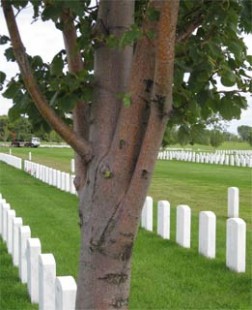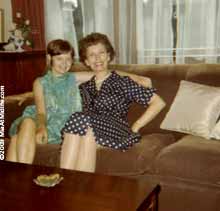The orderly rows of the national cemetery don’t suit my mother. In her life she was a jaunty jumble, plaid pants and crazy knickknack shelves, swirls of cigarette smoke, piano bench cascading with sheet music. Her topsy-turvy mornings in the kitchen on the red swivel stool with a foot propped on the broken dishwasher, the radio playing, the teeming ashtrays and lipsticked coffee cups, the sections of the morning newspaper splayed over heaps of books from the library.
The farrago of her nightstands and countertops. A thousand scraps of paper: receipts and grocery lists and all of her notes on everyday life: her elliptical book reviews (“Doris Lessing Golden Notebook—very good”); pediatric research (“amoxicillin best for pneumonia in children, but not if mycoplasma”); and news flashes from phone conversations [“John now vp for all of General Mills,” “Mia hurt knee and has new magazine for university”)—all scrawled in her breezy cursive, laced with the crooked lines and squiggles of her expert Gregg shorthand. Beyond the window, the colorful eccentricity of her garden, the large red rosebushes tangled in the cosmos.
My brimming, replete, untidy, exquisitely alive mother. She loved beauty and stimulating activity; had been the daughter of musicians, after all; had dressed in smart suits for a downtown business career. She did her best to fill the voids during her long and sometimes grim exile in the suburban split level, finding ways to project herself against the consuming sprawl of my father (every table and chair buried in his books and articles, every spare room given over to his hobbies, every wall festooned with his favored paintings and prints).
She made what lairs she could: the kitchen counter with its interesting jumbles; the bookcase next to her bed crammed with mementoes and family snapshots; the knickknack stand in a corner of the dining room, its carefully arranged and regularly dusted trinkets spanning a 19th-century Austrian music box from her grandmother and a misshapen nut bowl I’d made in 1st grade. The back stoop off the kitchen, where she stole moments of bliss in the evening beholding backyard beauty, smoking her menthol cigarettes as the sun swooshed its departing oranges above her garden.
But now. Her small marble marker (her embalmed remains in that well-joined oaken box—not even thinking of the bewildering corporeality of it), her perfectly measured gravesite lined up with precision in a row among thousands of others in a vast spare grassy flatland between freeway and airport. These grounds in some respects pretty, but never lovely: Too sparse, too stinting, too orderly, its few crabapples and oaks outmatched by acres of sod and long granite rows.
What, I think (kneeling to arrange the daisies and roses I have brought into the shiny little green cone picked up at the Flower Receptacle bin)–what has this relentlessly regimental landscape, this gravesite, this orderly and symmetrical place … what has any of this to do with my mother?
****************
I turned back one for one last look before I crossed the road to the car. Standing next to the tree (was it a Linden?) at the end of my mother’s row, my eye was drawn to the profusion of bright green shoots sprouting from the trunk. Well, I thought, that’s something.
And then, driving slowly around the loop road toward the entrance, I came to a small crowd of mourners at what was clearly a military funeral, two dozen greying army men standing at attention (in their pressed green slacks and shirtsleeves and berets) for the rifle salute of an honor guard. I stopped some 30 yards away, entirely undone as a bugler played “Taps.”
This very formal and militaristic sendoff, not particularly large, few mourners aside from the honor guard, something routine and lackluster about it all—and the bugler’s “Day is Done” strains had a discernibly wobbling tone. Yet still, the somber ceremony moved me. Attention was paid, I thought … recalling, in contrast, the sorry sendoff for my mother on that frigid day in February.
Our ragtag assemblage at the funeral home, the awkward strain of dealing with my impaired father, the tuneless “I’ll Be Seeing You” pinged out by the hack pianist the funeral home had hired … and then our little group shivering for no more than two or three minutes over my mother’s casket in a “committal area” reminiscent of a warehouse storage facility area as the sweaty Father Dobrozky galloped at breakneck speed through a Hail Mary before fleeing in his waiting car.
No “Taps” for her, I thought, looking toward the grave where my mother’s remains had so unceremoniously been committed to the sod, looking across the long rows stretching toward the airport on one side and the freeway on the other. Eyes welling and heart bursting; yearning for proper commemoration not only of my mother’s death, but of the 85 years she had lived.
This is how it is, I thought. A lifetime of experiences and memories, of stirring the earth’s molecules daily and for decades with your gifts and strivings and yearnings, of tending nasturtiums and sick children, of knowing things and writing things down and regarding beauty and making music, of laughter and sufferings and prayers. Just gone. Just gone: my untidy, vibrant, remarkable mother.










